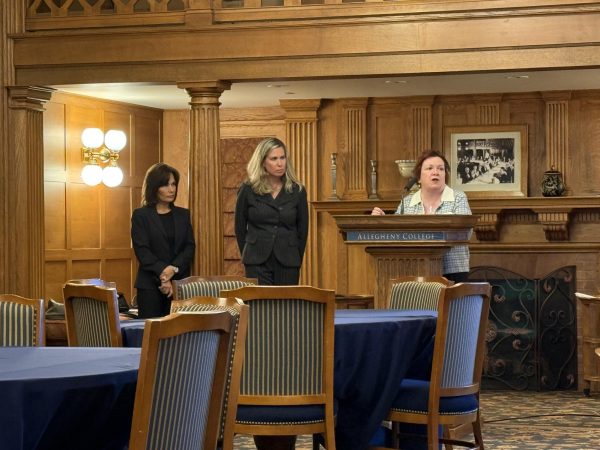Library staff works to control mold infestation
A sheet of plastic hangs across a section of Pelletier Library’s first floor, indicating that the section is closed. This area, containing the compact—or mobile—shelving units and approximately 25,000 volumes of books and journals, was closed on Sept. 1 due to a mold outbreak, according to Systems Librarian Alan Bartlett.
Bartlett said 1,650 books and journals have been identified as contaminated. He said approximately 746 have “significant mold.”
The source of the mold was a leaking pipe, according to Rick Holmgren, vice president for information services and assessment. Bartlett said Physical Plant has since fixed the pipe.
“With that fixed, I’m cautiously optimistic we’ll be able to control the humidity, and certainly Physical Plant is committed to making sure we don’t have this problem again,” Holmgren said.
Manager of Access Services Aimee Reash said the Pelletier staff reviewed the Dewey Decimal System on Aug. 28 and did not notice mold at that time.
According to Reash, this is the second outbreak of mold in the library in the past four years.
“We did have a mold outbreak in 2012 very close to the same section of the library,” Reash said.
According to Holmgren, Physical Plant will contract a mold remediation team to contain and remove the mold outbreak. He said every book and volume must be cleaned by hand and that some volumes are so badly contaminated that they must be discarded.
Holmgren said the library currently has no timeline for when the mold will be cleaned. He said that while that section of the library is currently closed, the library can use interlibrary loan or online resources to provide access to materials in that area.
“We can, in some cases—if our copy’s been compromised—we can get access to you,” Holmgren said.
The Campus reported on Feb. 1, 2013, that 3,500 books and 40,000 government documents had to be discarded due to the 2012 mold outbreak.
“Since then we’ve been monitoring the humidity on a regular basis, and both [Physical] Plant and the library have been doing that,” Holmgren said.
Reash said the library staff will defer to a mold remediation team to determine which volumes need to be removed from the collection.
“We actually won’t have to make those decisions,” Reash said. “In 2012, when we worked with a mold remediation team, they were able to clean the books and suggest which should be discarded.”
The decision to replace the discarded volumes with print or electronic copies will depend on a variety of factors, including its frequency of use, according to Holmgren.
“We prefer to get electronic books unless there’s a reason to get it in print,” Holmgren said.
Regardless of the state of the books, Holmgren said, he hopes to open up the closed-off section of the first floor for student seating, especially for the end of the semester and finals week.





